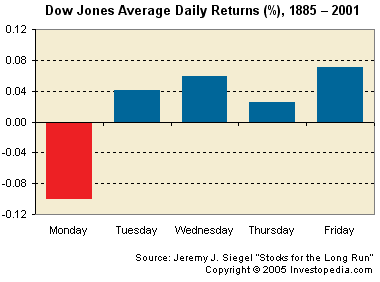Unlike traditional investing, trading has a short-term focus. The trader buys a stock not to hold for gradual appreciation, but for a quick turnaround, often within a pre-determined time period: a few days, a week, month or quarter. And of course day trading, as the name implies, has the shortest time frame of all: Analysis may be broken down to days, hours and even minutes, and the time of day in which a trade is made can be an important factor to consider.
Is there a best day of the week to buy stocks? Or a best day to sell stock? Does a best time of year to buy stocks exist? How about a best month to buy stocks, or to unload them? In this article, we’ll show you how to time trading decisions according to daily, weekly and monthly trends.
Best Times of Day to Buy Stocks (or Sell Them)
First thing in the morning, market volumes and prices can go wild. The opening hours represent the window in which the market factors in all of the news releases since the previous closing bell, which contributes to price volatility. A skilled trader may be able to recognize the appropriate patterns and make a quick profit, but a less skilled trader could suffer serious losses as a result. So if you’re a novice, you may want to avoid trading during these volatile hours – or at least, within the first hour.
However, for seasoned day traders, that first 15 minutes following the opening bell is prime time, usually offering some of the biggest trades of the day on the initial trends. The whole 9:30 to 10:30 AM period is often one of the best hours of the day for day trading, offering the biggest moves in the shortest amount of time (a great and efficient combination). Extend it out to 11:30 AM EST if you want another hour of trading. A lot of professional day traders stop trading around then, as that is when volatility and volume tend to taper off. Once that happens, trades take longer and moves are smaller with less volume.
If day trading index futures such as S&P 500 E-Minis, or an actively traded index ETF such as the S&P 500 SPDR, you can be begin trading as early as 8:30 AM (pre-market) and then begin tapering offer around 10:30 AM. As with stocks, trading can continue up to 11:30 AM, but only if the market is still providing opportunities.
The middle of the day tends to be the most calm and stable period of most trading days. No, it’s not that traders are on lunch break: It’s that this is the time of day when people are waiting for further news to be announced. Because most of the day’s news releases have already been factored into stock prices, many are watching to see where the market may be heading for the remainder of the day. Because prices are relatively stable during this period, it’s a good time for a beginner to place trades, as the action is slower and the returns might be more predictable.
In the last hours of the trading day, volatility and volume increase again. In fact, common intra-day stock market patterns show the last hour can be like the first: full sharp reversals and big moves, especially in the last several minutes of trading. From 3:00 to 4:00 PM, day traders are often trying to close out their positions, or they may be attempting to join a late-day rally in the hope that the momentum will carry forward into the next trading day.
Best Day of the Week to Buy Stock: Monday
It’s called the Monday Effect. For decades, the stock market has had a tendency to drop on Mondays, on average. Some studies, as in “A Survey of the Monday Effect Literature” by Glenn N. Pettengill in the Quarterly Journal of Business and Economics (2003), have attributed this to a large amount of bad news that is often released over the weekend. Others point to investors’ gloomy mood at having to go back to work, which is especially evident during the early hours of Monday trading.
 |
If you’re planning on buying stocks, you’re better off doing it on a Monday than any other day of the week, and snapping up some bargains.
